Unit 1 Where did you go on vacation Section A 1a-2d课件(共39张PPT)
文档属性
| 名称 | Unit 1 Where did you go on vacation Section A 1a-2d课件(共39张PPT) | 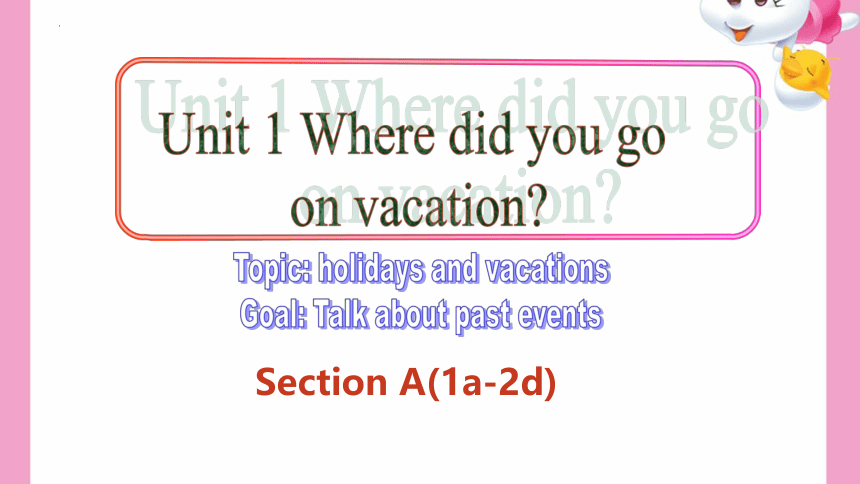 | |
| 格式 | zip | ||
| 文件大小 | 2.0MB | ||
| 资源类型 | 教案 | ||
| 版本资源 | 人教新目标(Go for it)版 | ||
| 科目 | 英语 | ||
| 更新时间 | 2022-08-03 17:25:20 | ||
图片预览

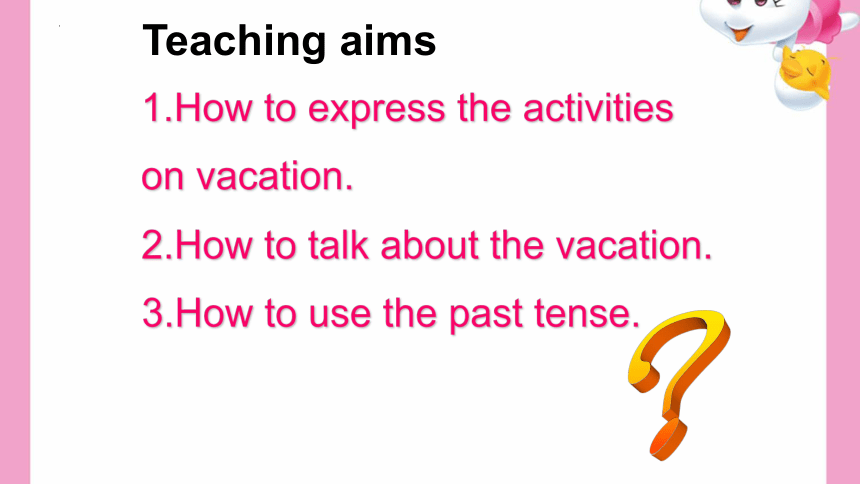
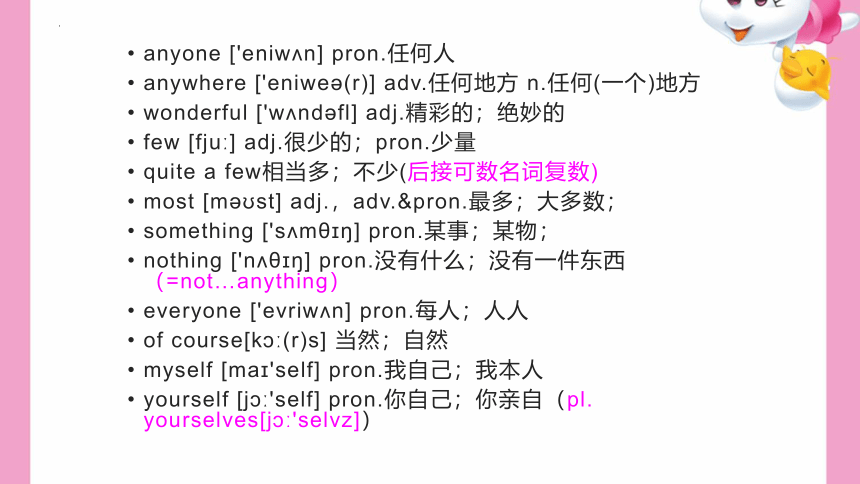
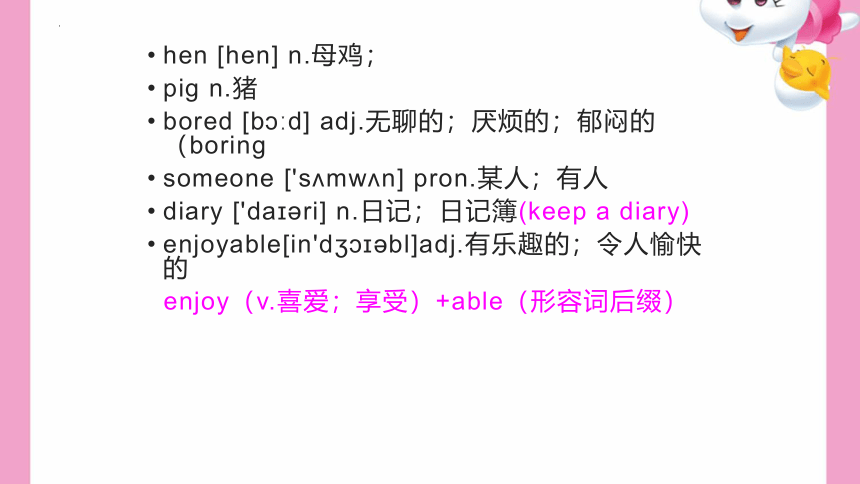
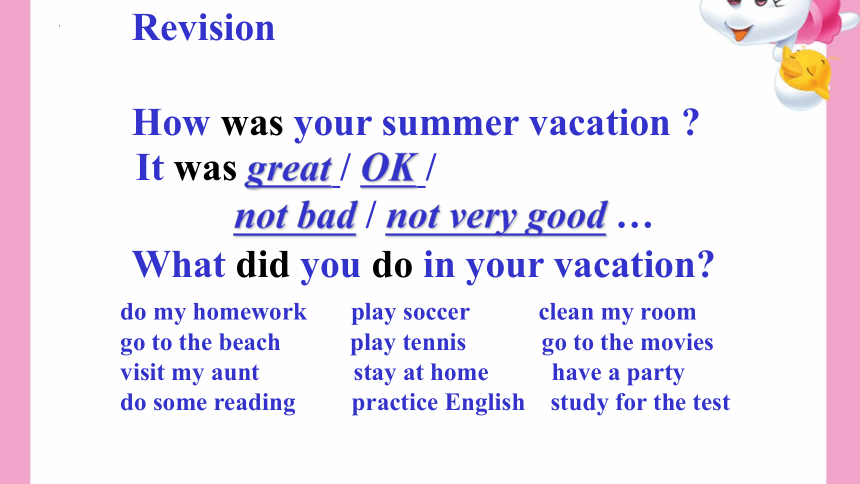
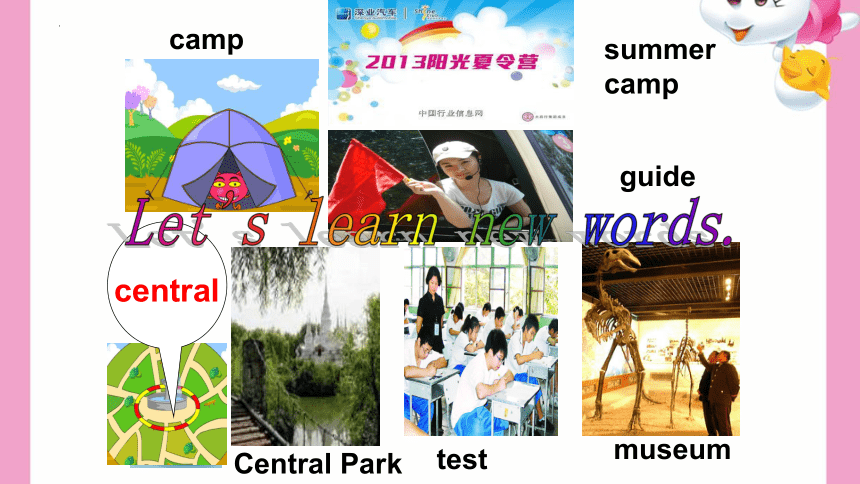
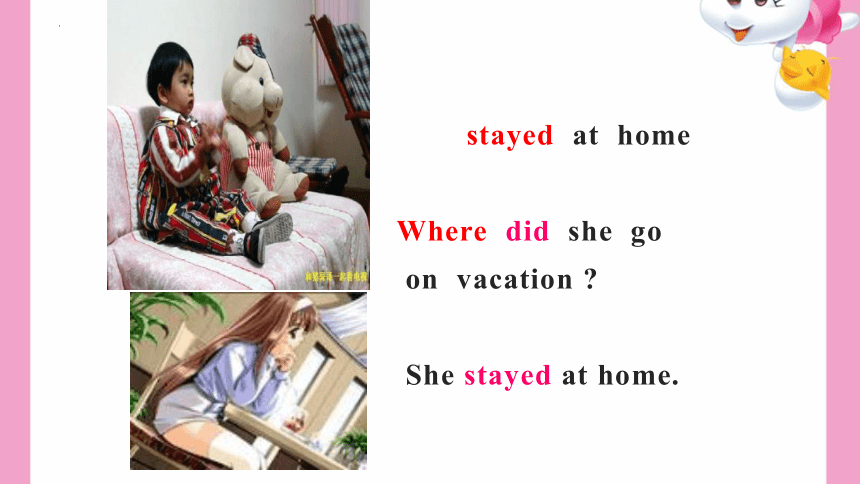
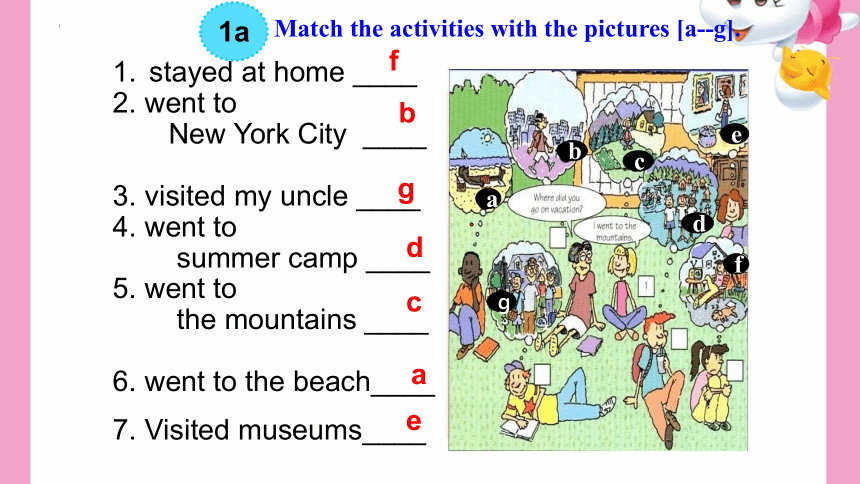
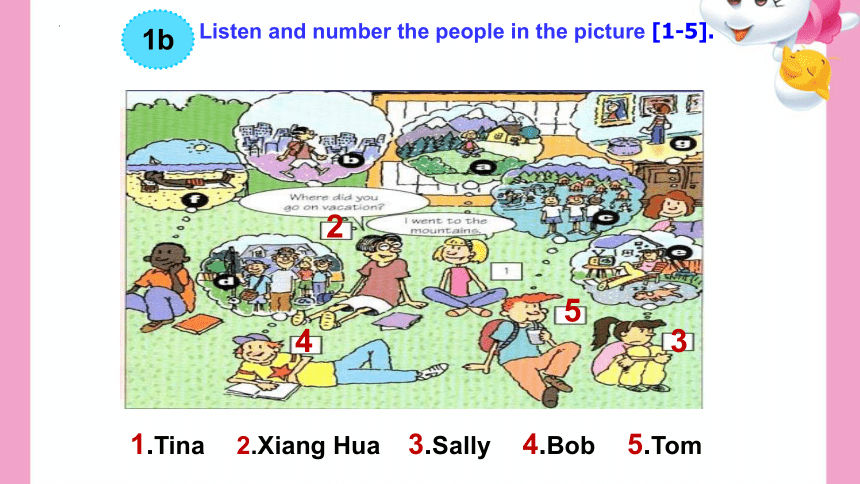
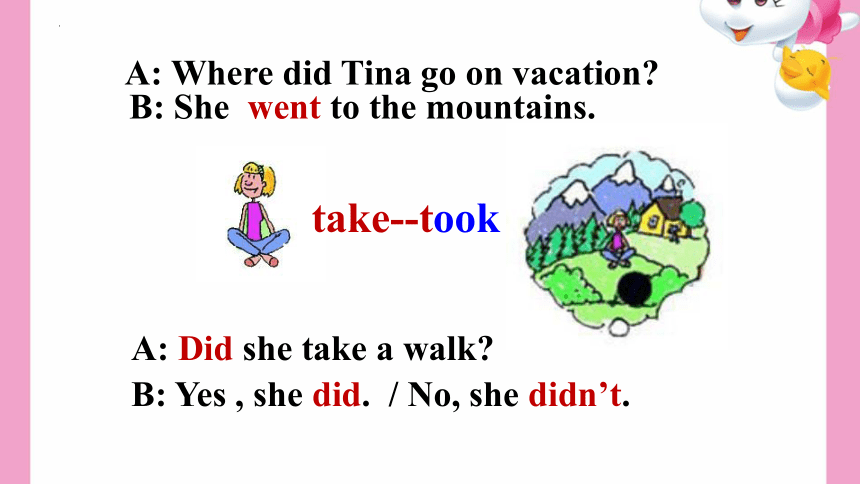
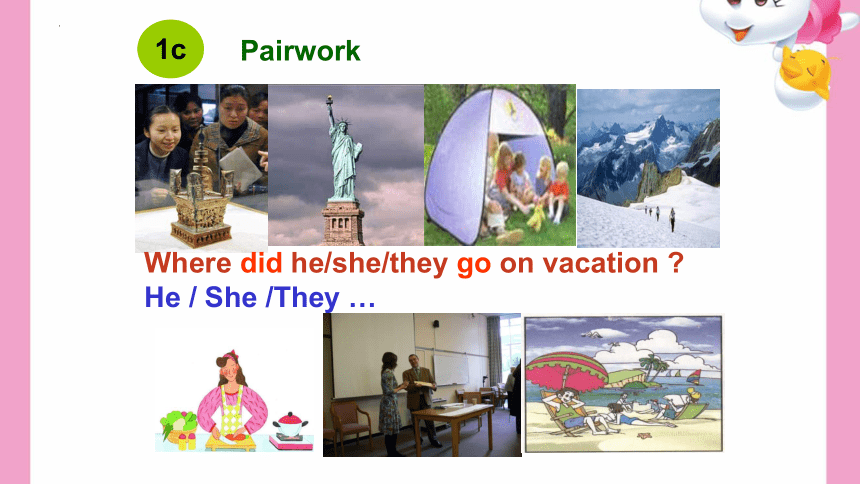
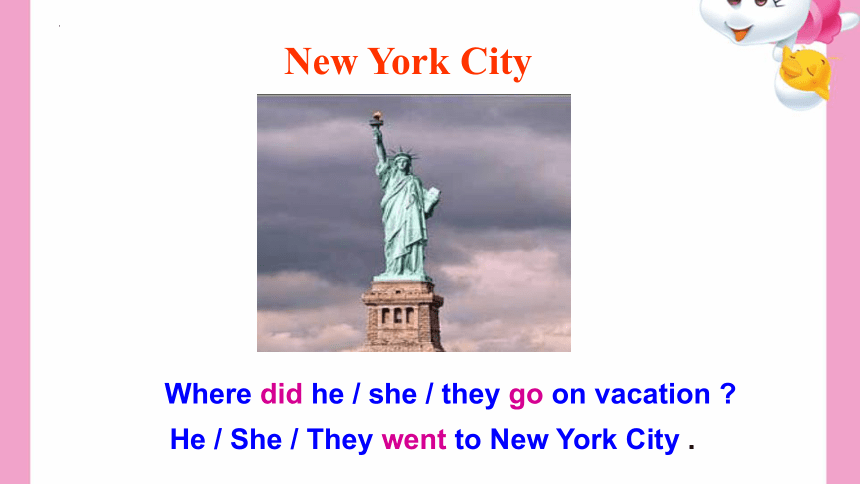
文档简介
(共39张PPT)
Unit 1 Where did you go
on vacation
Topic: holidays and vacations
Goal: Talk about past events
Section A(1a-2d)
Teaching aims
1.How to express the activities on vacation.
2.How to talk about the vacation.
3.How to use the past tense.
anyone ['eniw n] pron.任何人
anywhere ['eniwe (r)] adv.任何地方 n.任何(一个)地方
wonderful ['w nd fl] adj.精彩的;绝妙的
few [fju ] adj.很少的;pron.少量
quite a few相当多;不少(后接可数名词复数)
most [m st] adj.,adv.&pron.最多;大多数;
something ['s mθ ] pron.某事;某物;
nothing ['n θ ] pron.没有什么;没有一件东西(=not…anything)
everyone ['evriw n] pron.每人;人人
of course[k (r)s] 当然;自然
myself [ma 'self] pron.我自己;我本人
yourself [j 'self] pron.你自己;你亲自(pl. yourselves[j 'selvz])
hen [hen] n.母鸡;
pig n.猪
bored [b d] adj.无聊的;厌烦的;郁闷的(boring
someone ['s mw n] pron.某人;有人
diary ['da ri] n.日记;日记簿(keep a diary)
enjoyable[in'd bl]adj.有乐趣的;令人愉快的
enjoy(v.喜爱;享受)+able(形容词后缀)
Revision
How was your summer vacation
What did you do in your vacation
It was great / OK /
not bad / not very good …
do my homework play soccer clean my room
go to the beach play tennis go to the movies
visit my aunt stay at home have a party
do some reading practice English study for the test
summer
camp
guide
camp
museum
test
Central Park
central
Let's learn new words.
stayed at home
Where did she go
on vacation
She stayed at home.
stayed at home ____
2. went to
New York City ____
3. visited my uncle ____
4. went to
summer camp ____
5. went to
the mountains ____
6. went to the beach____
7. Visited museums____
f
b
g
e
c
a
d
Match the activities with the pictures [a--g].
a
b
c
g
f
e
d
1a
Listen and number the people in the picture [1-5].
1.Tina 2.Xiang Hua 3.Sally 4.Bob 5.Tom
3
5
2
4
1b
A: Where did Tina go on vacation
B: She went to the mountains.
A: Did she take a walk
B: Yes , she did. / No, she didn’t.
take--took
Where did he/she/they go on vacation
He / She /They …
1c
Pairwork
Where did he / she / they go on vacation
He / She / They went to New York City .
New York City
Where did they go on vacation
They went to the beach .
beach
Listening
Listen. Where did the people go on vacation Complete the chart.
2a
People Places
Grace
Kevin
Julie
New York City
The beach
Stayed at home
Listen again. Check (√) Yes, I did or No, I didn’t for each question.
2b
Did you… Yes, I did. No, I didn’t
Grace go with anyone
go to central Park
Buy anything special
Kevin Play volleyball
Swim
Meet anyone interesting
√
√
√
√
√
√
Did you… Yes, I did. No, I didn’t
Julie Do anything interesting
Study for tests
Go out with anyone
√
√
√
Pairwork
Role-play the conversations between Grace, Kevin and Julie.
2c
A: Grace, where did you go on
vacation
B: I went to New York City.
A: Oh, really Did you go with anyone
B: Yes, I went with my mother.
Kevin, where did you go on vacation
I ...
Oh, really Did you go with anyone
Yes, I ...
Julie, where did you go on vacation
I ...
Oh, really Did you go with anyone
Yes, I ...
2d
Reading
Read the conversation and match the people with the right place.
Helen
Rick
Rick
Rick
Helen
Rick
Helen
Rick
Role play
Role-play the conversation.
Rick: Hi, Helen. Long time no see.
Helen: Hi, Rick. Yes, I was on vacation last
month.
Rick: Oh, did you go anywhere interesting
Helen: Yes, I went to Guizhou with my
family.
Rick: Wow! Did you see Huangguoshu
Waterfall
Helen: Yes, I did. It was wonderful! We
took quite a few photos there. What
about you Did you do anything
special last month
Rick: Not really. I just stayed at home
most of the time to read and relax.
Explanation
1. Did you buy anything special
在英语中,anything, something, nothing和everything是用于指代事物的复合不定代词,与之相对应的复合不定代词anyone, someone, no one和everyone (anybody, somebody, nobody和everybody) 用于指人。与形容词连用时,形容词必须置于复合不定词之后,语法上称作“后置”。
例如:I can see someone new in your group.
There’s nothing interesting in the news today.
2. Did you go anywhere interesting
anywhere意为“在任何地方”,常用于一般疑问句或否定句中,代替somewhere。例如:
I can’t find my keys anywhere.
我到处找不到我的钥匙。
3. We took quite a few photos there.
a few 意为“一些,若干(=some)”,后跟可数名词复数形式。
quite a few 意为“相当多;不少(=many)”后跟可数名词复数形式。 例如:
A few girls are playing volleyball.
几名女孩正在打排球。
There are quite a few birds in the forest.
在那片森林里有大量的鸟。
4. I just stayed at home most of the time to read and relax.
most意为“大多数”,后跟可数名词或不可数名词均可。例如:
Most students go to school on foot.
大多数学生步行去上学。
【辨析】
most + 名词 泛指多数,无范围;
most + of + the (this/that/those/these等)名词 ,指某一范围内的多数。 例如:
Most of the students go to school by bike.
这些学生们中的多数骑自行车去上学。
1. Tom and Mary _______ (come) to China last month.
2. My daughter ________ (not go) to school yesterday.
3. —_____ she _________ (practice) her
guitar yesterday
—No, she ___________.
4. There _______ (be) three trees around my
house last year.
5. —What _____ you ______ (do) last weekend
—I _________ (study) math on Saturday.
came
didn’t go
Exercises: 用所给动词的适当形式填空。
Did practice
were
did do
didn’t
studied
1. Lucy did her homework yesterday evening. (改为否定句)
Lucy ______ __ _____ _________ yesterday evening.
2. I had lunch at my friend’s home.
(改为一般疑问句,并作肯定回答)
—____ you ______ _____ at your friend’s home
—______, ___ _____.
3. Jim went to the beach last Sunday. (对画线部分提问)
_____ _____ Jim ______ last Sunday
4. They played basketball yesterday. (对画线部分提问)
________ _______ they play basketball
5. The students had great fun in the park. (改为同义句)
The students _____ ______ ____ _______ in the park.
didn’t do her homework
Did have lunch
Yes I did
What did do
根据要求改写下列句子。
When did
had a good / great time
1. 决定做某事 ___________________
2. 帮某人做某事 ___________________
3. 参观故宫 ___________________
4. 在度假 ___________________
5. 去爬山 ___________________
6. 去购物 ___________________
I. 翻译下列词组。
decide to do sth.
help sb. (to) do sth.
visit the Palace Museum
be on vacation
go to the mountains
go shopping
词汇练习
7. 发现某人正在做某事 ________________
8. 太拥挤 ____________________
9. have great fun doing sth. __________
10. feel tired ___________
11. walk back to the room ___________
12. the Great Wall ___________
做某事很愉快
感觉累
走回房间
长城
find sb. doing sth.
too crowded
1. The Blacks always go to that
m________ to learn about Chinese history.
2. Sad movies always make me
c_____.
3. How d___________ the beef dumplings
are!
4. The computer isn’t e____________. I will
take it.
5. All of us are studying for the English
e________.
II. 根据句意及首字母提示完成单词。
useum
ry
elicious
xpensive
xam
III. 根据句意及汉语提示填入正确的单词。
1. Three of my ___________ (同班同学) are from America.
2. It is usually ________ (多雨的) in summer here.
3. The shorts on sale are very ______ (便宜).
4. Mr. And Mrs. Black came _____(回到) to school last weekend.
5 The students are __________ (讨论) some questions with their English teacher.
classmates
rainy
cheap
back
discussing
1. Tom and Mary _______ (come) to China last month.
2. My daughter ________ (not go) to school yesterday.
3. —_____ she _________ (practice) her
guitar yesterday
—No, she ___________.
4. There _______ (be) three trees around my
house last year.
5. —What _____ you ______ (do) last weekend
—I _________ (study) math on Saturday.
came
didn’t go
IV. 用所给动词的适当形式填空。
Did practice
were
did do
didn’t
studied
1. Lucy did her homework yesterday evening. (改为否定句)
Lucy ______ __ _____ _________ yesterday evening.
2. I had lunch at my friend’s home.
(改为一般疑问句,并作肯定回答)
—____ you ______ _____ at your friend’s home
—______, ___ _____.
3. Jim went to the beach last Sunday. (对画线部分提问)
_____ _____ Jim ______ last Sunday
4. They played basketball yesterday. (对画线部分提问)
________ _______ they play basketball
5. The students had great fun in the park. (改为同义句)
The students _____ ______ ____ _______ in the park.
didn’t do her homework
Did have lunch
Yes I did
What did do
V. 根据要求改写下列句子。
When did
had a good / great time
一.根据句意及首字母填空。
1.Where did you go on v________.
2.Tina went to summer c________.
3.Did Lucy v_______ her uncle Yes,she did.
4.Where did Sally go She w______ to New York.
acation
amp
isit
ent
Do some exercises
二.汉译英.
1.呆在家里
2.去夏令营
3.去爬山
4.参观博物馆
5.去度假
6.去沙滩
7.去看爷爷奶奶
stay at home
go to summer camp
go to the mountains
visit the museum
go on vacation
go to the beach
visit the grandparents
Exercise
三.根据汉语提示完成句子。
1. Did he go out with _______ (任何人)
2. They didn’t buy ________ ______ (特殊的东西) there yesterday.
3. Tell us __________ __________ (有趣的事情) about your vacation, Jenny.
anyone
something interesting
anything special
Homework
Make a conversation about what did you do last week.
Master the words in this unit and pre-view next part.
Thank you for listening!
GOODBYE!
Unit 1 Where did you go
on vacation
Topic: holidays and vacations
Goal: Talk about past events
Section A(1a-2d)
Teaching aims
1.How to express the activities on vacation.
2.How to talk about the vacation.
3.How to use the past tense.
anyone ['eniw n] pron.任何人
anywhere ['eniwe (r)] adv.任何地方 n.任何(一个)地方
wonderful ['w nd fl] adj.精彩的;绝妙的
few [fju ] adj.很少的;pron.少量
quite a few相当多;不少(后接可数名词复数)
most [m st] adj.,adv.&pron.最多;大多数;
something ['s mθ ] pron.某事;某物;
nothing ['n θ ] pron.没有什么;没有一件东西(=not…anything)
everyone ['evriw n] pron.每人;人人
of course[k (r)s] 当然;自然
myself [ma 'self] pron.我自己;我本人
yourself [j 'self] pron.你自己;你亲自(pl. yourselves[j 'selvz])
hen [hen] n.母鸡;
pig n.猪
bored [b d] adj.无聊的;厌烦的;郁闷的(boring
someone ['s mw n] pron.某人;有人
diary ['da ri] n.日记;日记簿(keep a diary)
enjoyable[in'd bl]adj.有乐趣的;令人愉快的
enjoy(v.喜爱;享受)+able(形容词后缀)
Revision
How was your summer vacation
What did you do in your vacation
It was great / OK /
not bad / not very good …
do my homework play soccer clean my room
go to the beach play tennis go to the movies
visit my aunt stay at home have a party
do some reading practice English study for the test
summer
camp
guide
camp
museum
test
Central Park
central
Let's learn new words.
stayed at home
Where did she go
on vacation
She stayed at home.
stayed at home ____
2. went to
New York City ____
3. visited my uncle ____
4. went to
summer camp ____
5. went to
the mountains ____
6. went to the beach____
7. Visited museums____
f
b
g
e
c
a
d
Match the activities with the pictures [a--g].
a
b
c
g
f
e
d
1a
Listen and number the people in the picture [1-5].
1.Tina 2.Xiang Hua 3.Sally 4.Bob 5.Tom
3
5
2
4
1b
A: Where did Tina go on vacation
B: She went to the mountains.
A: Did she take a walk
B: Yes , she did. / No, she didn’t.
take--took
Where did he/she/they go on vacation
He / She /They …
1c
Pairwork
Where did he / she / they go on vacation
He / She / They went to New York City .
New York City
Where did they go on vacation
They went to the beach .
beach
Listening
Listen. Where did the people go on vacation Complete the chart.
2a
People Places
Grace
Kevin
Julie
New York City
The beach
Stayed at home
Listen again. Check (√) Yes, I did or No, I didn’t for each question.
2b
Did you… Yes, I did. No, I didn’t
Grace go with anyone
go to central Park
Buy anything special
Kevin Play volleyball
Swim
Meet anyone interesting
√
√
√
√
√
√
Did you… Yes, I did. No, I didn’t
Julie Do anything interesting
Study for tests
Go out with anyone
√
√
√
Pairwork
Role-play the conversations between Grace, Kevin and Julie.
2c
A: Grace, where did you go on
vacation
B: I went to New York City.
A: Oh, really Did you go with anyone
B: Yes, I went with my mother.
Kevin, where did you go on vacation
I ...
Oh, really Did you go with anyone
Yes, I ...
Julie, where did you go on vacation
I ...
Oh, really Did you go with anyone
Yes, I ...
2d
Reading
Read the conversation and match the people with the right place.
Helen
Rick
Rick
Rick
Helen
Rick
Helen
Rick
Role play
Role-play the conversation.
Rick: Hi, Helen. Long time no see.
Helen: Hi, Rick. Yes, I was on vacation last
month.
Rick: Oh, did you go anywhere interesting
Helen: Yes, I went to Guizhou with my
family.
Rick: Wow! Did you see Huangguoshu
Waterfall
Helen: Yes, I did. It was wonderful! We
took quite a few photos there. What
about you Did you do anything
special last month
Rick: Not really. I just stayed at home
most of the time to read and relax.
Explanation
1. Did you buy anything special
在英语中,anything, something, nothing和everything是用于指代事物的复合不定代词,与之相对应的复合不定代词anyone, someone, no one和everyone (anybody, somebody, nobody和everybody) 用于指人。与形容词连用时,形容词必须置于复合不定词之后,语法上称作“后置”。
例如:I can see someone new in your group.
There’s nothing interesting in the news today.
2. Did you go anywhere interesting
anywhere意为“在任何地方”,常用于一般疑问句或否定句中,代替somewhere。例如:
I can’t find my keys anywhere.
我到处找不到我的钥匙。
3. We took quite a few photos there.
a few 意为“一些,若干(=some)”,后跟可数名词复数形式。
quite a few 意为“相当多;不少(=many)”后跟可数名词复数形式。 例如:
A few girls are playing volleyball.
几名女孩正在打排球。
There are quite a few birds in the forest.
在那片森林里有大量的鸟。
4. I just stayed at home most of the time to read and relax.
most意为“大多数”,后跟可数名词或不可数名词均可。例如:
Most students go to school on foot.
大多数学生步行去上学。
【辨析】
most + 名词 泛指多数,无范围;
most + of + the (this/that/those/these等)名词 ,指某一范围内的多数。 例如:
Most of the students go to school by bike.
这些学生们中的多数骑自行车去上学。
1. Tom and Mary _______ (come) to China last month.
2. My daughter ________ (not go) to school yesterday.
3. —_____ she _________ (practice) her
guitar yesterday
—No, she ___________.
4. There _______ (be) three trees around my
house last year.
5. —What _____ you ______ (do) last weekend
—I _________ (study) math on Saturday.
came
didn’t go
Exercises: 用所给动词的适当形式填空。
Did practice
were
did do
didn’t
studied
1. Lucy did her homework yesterday evening. (改为否定句)
Lucy ______ __ _____ _________ yesterday evening.
2. I had lunch at my friend’s home.
(改为一般疑问句,并作肯定回答)
—____ you ______ _____ at your friend’s home
—______, ___ _____.
3. Jim went to the beach last Sunday. (对画线部分提问)
_____ _____ Jim ______ last Sunday
4. They played basketball yesterday. (对画线部分提问)
________ _______ they play basketball
5. The students had great fun in the park. (改为同义句)
The students _____ ______ ____ _______ in the park.
didn’t do her homework
Did have lunch
Yes I did
What did do
根据要求改写下列句子。
When did
had a good / great time
1. 决定做某事 ___________________
2. 帮某人做某事 ___________________
3. 参观故宫 ___________________
4. 在度假 ___________________
5. 去爬山 ___________________
6. 去购物 ___________________
I. 翻译下列词组。
decide to do sth.
help sb. (to) do sth.
visit the Palace Museum
be on vacation
go to the mountains
go shopping
词汇练习
7. 发现某人正在做某事 ________________
8. 太拥挤 ____________________
9. have great fun doing sth. __________
10. feel tired ___________
11. walk back to the room ___________
12. the Great Wall ___________
做某事很愉快
感觉累
走回房间
长城
find sb. doing sth.
too crowded
1. The Blacks always go to that
m________ to learn about Chinese history.
2. Sad movies always make me
c_____.
3. How d___________ the beef dumplings
are!
4. The computer isn’t e____________. I will
take it.
5. All of us are studying for the English
e________.
II. 根据句意及首字母提示完成单词。
useum
ry
elicious
xpensive
xam
III. 根据句意及汉语提示填入正确的单词。
1. Three of my ___________ (同班同学) are from America.
2. It is usually ________ (多雨的) in summer here.
3. The shorts on sale are very ______ (便宜).
4. Mr. And Mrs. Black came _____(回到) to school last weekend.
5 The students are __________ (讨论) some questions with their English teacher.
classmates
rainy
cheap
back
discussing
1. Tom and Mary _______ (come) to China last month.
2. My daughter ________ (not go) to school yesterday.
3. —_____ she _________ (practice) her
guitar yesterday
—No, she ___________.
4. There _______ (be) three trees around my
house last year.
5. —What _____ you ______ (do) last weekend
—I _________ (study) math on Saturday.
came
didn’t go
IV. 用所给动词的适当形式填空。
Did practice
were
did do
didn’t
studied
1. Lucy did her homework yesterday evening. (改为否定句)
Lucy ______ __ _____ _________ yesterday evening.
2. I had lunch at my friend’s home.
(改为一般疑问句,并作肯定回答)
—____ you ______ _____ at your friend’s home
—______, ___ _____.
3. Jim went to the beach last Sunday. (对画线部分提问)
_____ _____ Jim ______ last Sunday
4. They played basketball yesterday. (对画线部分提问)
________ _______ they play basketball
5. The students had great fun in the park. (改为同义句)
The students _____ ______ ____ _______ in the park.
didn’t do her homework
Did have lunch
Yes I did
What did do
V. 根据要求改写下列句子。
When did
had a good / great time
一.根据句意及首字母填空。
1.Where did you go on v________.
2.Tina went to summer c________.
3.Did Lucy v_______ her uncle Yes,she did.
4.Where did Sally go She w______ to New York.
acation
amp
isit
ent
Do some exercises
二.汉译英.
1.呆在家里
2.去夏令营
3.去爬山
4.参观博物馆
5.去度假
6.去沙滩
7.去看爷爷奶奶
stay at home
go to summer camp
go to the mountains
visit the museum
go on vacation
go to the beach
visit the grandparents
Exercise
三.根据汉语提示完成句子。
1. Did he go out with _______ (任何人)
2. They didn’t buy ________ ______ (特殊的东西) there yesterday.
3. Tell us __________ __________ (有趣的事情) about your vacation, Jenny.
anyone
something interesting
anything special
Homework
Make a conversation about what did you do last week.
Master the words in this unit and pre-view next part.
Thank you for listening!
GOODBYE!
同课章节目录
- Unit 1 Where did you go on vacation?
- Section A
- Section B
- Unit 2 How often do you exercise?
- Section A
- Section B
- Unit 3 I'm more outgoing than my sister.
- Section A
- Section B
- Unit 4 What's the best movie theater?
- Section A
- Section B
- Unit 5 Do you want to watch a game show?
- Section A
- Section B
- Unit 6 I'm going to study computer science.
- Section A
- Section B
- Unit 7 Will people have robots?
- Section A
- Section B
- Unit 8 How do you make a banana milk shake?
- Section A
- Section B
- Unit 9 Can you come to my party?
- Section A
- Section B
- Unit 10 If you go to the party, you'll have a grea
- Section A
- Section B
